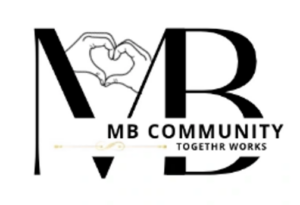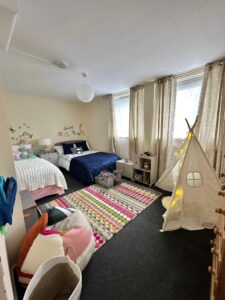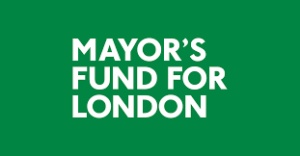4in10 Newsletter 19.2.26
Read the latest newsletter here.
To get this directly to your inbox every fortnight please do join us.
4in10 Newsletter 5.2.26
Read the latest newsletter here.
To get this directly to your inbox every fortnight please do join us.
Spotlight Interview with MB Community CIC
MB Community CIC

Comments from Omari the Director of MB Community CIC
- How are you helping to tackle child poverty in London?
We tackle child poverty by removing cost barriers and creating free, local opportunities for children and families in areas with high deprivation. Our work focuses on free sports sessions, holiday activities, youth programmes and community events that improve physical health, confidence and social connection. We also work closely with schools, councils and early help teams to reach families who may be struggling financially or socially, ensuring support is delivered in familiar, trusted spaces such as parks, schools and community hubs.
- Tell us something you are excited about.
We are excited about developing community-led spaces and programmes that bring families together consistently, not just for one-off activities. In particular, growing our work around community hubs and youth forums feels important, as it gives young people and families a voice in shaping what happens in their local area.
- Share something positive about your organisation’s achievement or service.
One of our proudest achievements is building strong engagement with young people who may not otherwise access structured activities. We consistently see improvements in confidence, attendance and behaviour, and we are trusted by parents, schools and partners to deliver safe, inclusive and welcoming sessions. Our ability to engage families as well as young people is a key strength.
- What can other network members learn from you or find out more about through you?
Other members can learn about practical, grassroots delivery – what genuinely works when engaging children, young people and families facing financial pressure. We are happy to share learning around outreach, building trust locally, partnership working with councils and schools, and delivering impactful programmes on limited budgets.
- What would most help you achieve your goals?
Flexible funding and longer-term support would help us plan sustainably and deepen our impact. Strong partnerships, shared learning across the network, and opportunities to collaborate rather than duplicate work would also make a significant difference.
- Why did you join 4in10? What do you enjoy about being part of the network?
We joined 4in10 because tackling child poverty requires collaboration, not isolated working. We value being part of a network that shares knowledge, amplifies lived experience and advocates for systemic change. Being part of 4in10 helps us stay connected, informed and motivated, while ensuring the voices of the communities we work with are reflected in wider conversations.
4in10 Newsletter 8.1.26
Read the latest newsletter here.
To get this directly to your inbox every fortnight please do join us.
4in10 Newsletter 18.12.25
Read the latest newsletter here.
To get this directly to your inbox every fortnight please do join us.
Spotlight Interview with Healing Homes West
Healing Homes West

Comments from Laura Hickman, Co/Founder, Social Worker & Therapeutic Lead
1. How are you helping to tackle child poverty in London?
‘Healing Homes West’ is a small women-led community project transforming unsafe housing into healing spaces for children and single parent families living in poverty in West London.
At Healing Homes West, we believe that every child has the right to grow up in a safe and comfortable home. Trauma recovery is not possible without the safe foundations. We provide trauma informed makeovers, working alongside families, supporting participation throughout the process. We furnish bedrooms and whole homes, by offering hands-on, compassionate support to create welcoming, uplifting spaces for families who need it most. We work alongside families and referrers taking into account the individual needs of the family and providing a practical solution that can support wider parenting or mental health concerns.
Our referrals are mainly from social workers and local partners where poor housing conditions are negatively impacting on the child’s and family’s wellbeing.
Too often we feel powerless to address the practical aspects of poor housing. While we cannot change the housing system, we can work together to alleviate some of the immediate challenges. Our makeovers not only provide fast, practical relief, but can also open the door to stronger engagement with support services that lead to better outcomes for children and families.
We rely on the kindness of volunteers, good quality second-hand donations, new donations from brands that would otherwise go into landfill, we use amazon wish lists and privately fundraise.
2. Tell us something you are excited about?
Healing Homes West has been developing slowly over the last 18 months and we still have much to learn but are totally committed. We have established a strong identity for Healing Homes West and created a model that we believe is compassionate, effective and empowering.
We are excited by our achievements so far, we have helped over 60 people including 14 bespoke bedrooms as well as refurbishing 6 whole flats, since July 24. We have also refurbished two refuges for women and children escaping domestic abuse to create welcoming, calming shared spaces that would support connection and recovery.
The feedback we have received from carers, children, and referrers has been overwhelmingly positive, clearly demonstrating the transformative power of improving home conditions. Not only do these changes create safer and more comfortable environments, but they also have a wider ripple effect, enhancing overall wellbeing for families.
We are excited for when our charity is officially registered as this will allow us to support many more children and families, experience the far-reaching benefits of a healing home.
3. Share with our members something positive about your organisation’s achievement or service?
Our most recent makeover was creating a bedroom for a courageous 14-year-old girl. She has had a really tough time and as a young carer, has faced isolation and loneliness. Following the makeover, she expressed her gratitude by sending us a beautiful poem, which she has kindly allowed me to share with you.
My Pink Room
I’m only fourteen, but I feel so much older, the world put its weight on my tiny shoulders.
I make tea for nan when she cries or screams, and whisper to silence my broken dreams.
we used to sit and watch tv together but now even being in the same room with her makes my body shiver, some days her words cut deep like glass, but i smile even though I’m holding back tears, I can feel my breathe start to shake and my throat start to ache, there was no place I could call my own, no space to breathe no “me” just “home” just walls that echoed, cold and grey where laughter faded long away.
then one day they build me a room,
the first time I opened that white door I cried, I cried because I’ve never had a room that was just “mine” soft green walls that harmonized with the pink everything was just perfect. outside my door the shouting stays, but in my room the hurt decays, and maybe that’s all I needed to bloom a little pink hope, in my little pink room.
Thank you Healing Homes West
Dxx
4. What can other network members learn from you or find out more about through you?
We work alongside families and professionals as part of a wider intervention that can lead to change. Our team consists of women with different experiences and skills that complement each other and include interior design, social work and trauma recovery. We are passionate about sharing what we do and are keen to work in collaboration with anyone working to support children and families living in poverty. Our dream is for our Healing Homes model to be adopted and established in other parts of London and the UK.
5. What would most help you achieve your goals?
Achieving charity status – have social media and admin support, find sponsorship, increase our partnerships, identify funding, have a van and one day a healing community space where families can come and connect with one another.
6. Why did you join 4in10? What do you enjoy about being part of the 4in10 network?
The experiences of children and families living in poverty are so often invisible and ignored. In London its especially striking to see extreme wealth and deprivation existing side by side, yet so many people don’t grasp the reality of what it means for the lives of people affected. We joined 4 in 10 to be part of a collective voice, we are passionate about improving outcomes for children living in poverty and your network really helps give a voice to those who need it and brings other organisations together helping towards shaping change.


4in10 Newsletter 4.9.25
Read the latest newsletter here.
To get this directly to your inbox every fortnight please do join us.
4in10 Newsletter 21.8.25
Read the latest newsletter here.
To get this directly to your inbox every fortnight please do join us.
4in10 Newsletter 7.8.25
Read the latest newsletter here.
To get this directly to your inbox every fortnight please do join us.
4in10 Newsletter 24.7.25
Read the latest newsletter here.
To get this directly to your inbox every fortnight please do join us.
Spotlight Interview with The Mayor’s Fund for London
The Mayor’s Fund for London

Comments from Jade Harris, Director of Strategic Partnerships and Delivery
Mayor’s Fund for London is a charity that champions opportunities for young Londoners facing the biggest barriers.
- How are you helping to tackle child poverty in London?
The Mayor’s Fund for London tackles child poverty through a joined-up approach: providing food as a foundation, skills as a springboard, and power through our platform. We support young Londoners facing inequality by providing front-line support and long-term opportunity. Kitchen Social is our flagship food and community programme and the largest citywide provider of holiday food and activities. Through it, we ensure families have access to nutritious meals and opportunities to thrive during the school holidays. Alongside this, our employability programme Access Aspiration connects young people to employers and professional leaders. Giving underrepresented young Londoners careers insight they otherwise wouldn’t have access to, helping to remove the hidden barriers to employment and open pathways to good jobs.
- Tell us something you are excited about?
We’re excited about our ever-growing youth engagement work, creating more space for young Londoners to influence the decisions that affect their lives. By connecting young people and power in London, we help shift that power to young Londoners, so they have a bigger say in the city’s future. Through youth-led initiatives like our recent Young Londoners Summit and upcoming Westminster roundtable, we’re ensuring young people can both access opportunities and shape the systems around them. This work is expanding alongside our programmes, which continue to evolve to deliver impact for young people day to day and influence policy and strategy. Kitchen Social is delivering support during every school holiday, providing meals and access to positive opportunities from sports sessions and cooking classes to driving lessons and mental health workshops. Meanwhile, Access Aspiration is deepening its partnerships with employers across key growth sectors, giving more young people from underrepresented backgrounds direct access to real-world careers insight, work experience, and building key skills.
- Share with our members something positive about your organisation’s achievement or service?
In 2024, we supported over 89,000 young Londoners across all 32 boroughs. Through our Food and Communities programmes, we delivered more than 400,000 meals and 23,000 opportunities. At the same time, our Employability and Skills work provided over 16,000 skills development activities. Our model supports the whole journey: from healthy meals to hands-on career development, we help young people feel supported, skilled, and seen.
And we’re proud that the young people we work with report this back to us. Samiya, a member of our Youth Board, reflected on our work, saying: “Through the Mayor’s Fund for London’s initiatives, we begin to shape a world where diversity is celebrated, and individuals feel valued and safe in their communities. MFL fosters dialogue, promotes education, and empowers marginalised voices. These efforts work to address systemic inequalities and create a more compassionate society for future generations.”
- What can other network members learn from you or find out more about through you?
We’d love to share learning on how to design integrated models that meet urgent needs and unlock long-term systems change. With Kitchen Social and Access Aspiration, we’ve created programmes that deliver practical support, whilst influencing local systems, employer practice, and policy conversations. We also bring strong experience in cross-sector convening and youth-led co-design. We are always keen to collaborate with others exploring these approaches.
- What would most help you achieve your goals?
We’re focused on sustainable growth, ensuring we can meet growing need while continuing to influence the bigger picture. What would help most is multi-year investment and joined-up policy that enables us to deepen our impact, led by young Londoners. This kind of support will underpin our vision and mission for long-term, positive change. We want every young Londoner to be prepared for the future, not just with food and education, but with the confidence, networks, and skills to thrive in good careers.
- Why did you join 4in10? What do you enjoy about being part of the 4in10 network?
We joined 4in10 to be part of a collective, working to challenge the root causes of poverty in London. The network provides vital opportunities to share learning, amplify advocacy, and stand together for long-term change. It also enables us to work together with partners on big events such as the upcoming Child Poverty Summit with 4in10 and The Childhood Trust. Last year, we linked up with the Food Foundation on an episode of our youth-led podcast The Intersect, discussing food poverty and the power of youth voice in influencing policymakers.

